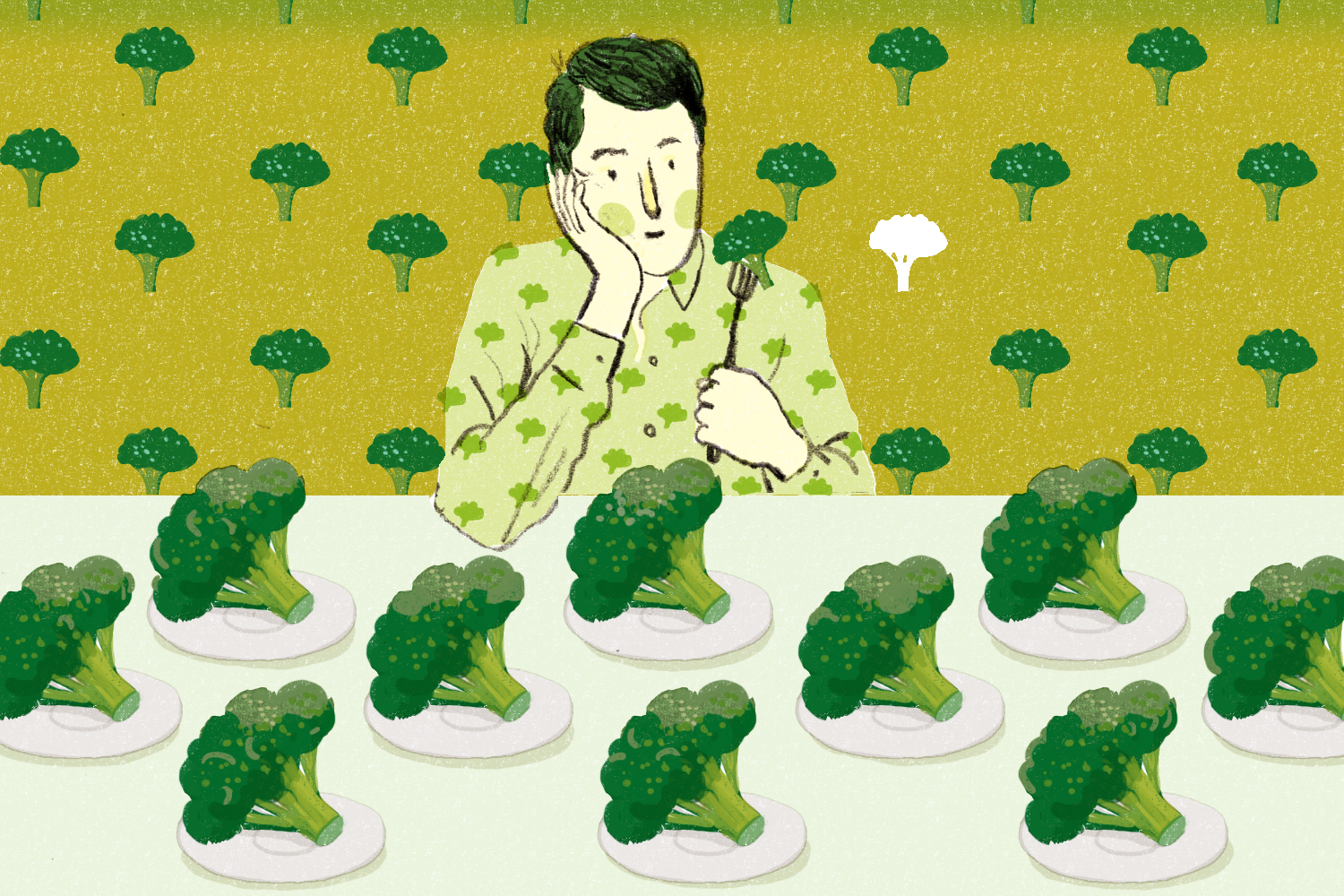
Meal planning and prep is a pain—especially during the workweek. So it’s easy to fall into the habit of buying, making and eating the same foods day in and day out. Fortunately, that’s not necessarily bad news for your health.
For one thing, “More food variety universally leads to more food intake,” says Dr. Susan Roberts, director of the Energy Metabolism Laboratory at Tufts University.
Imagine a buffet of vegetable dishes versus one large bowl of salad. You’ll eat more from the buffet every time, Roberts says, since we’re “hard wired” for food variety. Unfortunately, that instinct kicks in even if you replace the healthy veggie buffet with its more realistic equivalent: junk food. For that reason, Roberts says trimming your mealtime array of food options is one way to control overeating.
MORE 5 Healthy Eating Habits to Adopt This Year
We have that hard-wired instinct toward food diversity for a good reason. “No one food has all the nutrients we need in the optimum amounts, so eating a variety of foods means you are much more likely to get enough of each one,” Roberts explains.
But how much variety is enough, and how much is too much? A study from Brigham and Women’s Hospital and the Harvard School of Public Health found women who regularly ate 16 or 17 items from a healthy list of foods—which included fruits, vegetables, whole grains, cereals like quinoa, fish, and low-fat dairy—enjoyed a 42-percent drop in death from any cause compared to women who ate fewer than nine of the foods on that list.
You Asked: Your Top 10 Health Questions Answered










On the other hand, there’s some very preliminary research that suggests eating a varied diet may have some not-so-hot health effects when it comes to your microbiome. That’s the network of microorganisms that lives in your body and supports your digestive system, helps control your appetite and performs dozens of other essential functions.
MORE 7 Things You Should Know About Shrimp
Typically, microbe diversity is a good thing when it comes to your gut. But, according to Dr. Daniel Bolnick, an ecologist at the University of Texas, “We’ve shown that in some animals, mixing foods actually reduces the number and variety of gut microbes.”
Bolnick says the takeaway at this stage isn’t that eating a wide variety of foods is bad, but rather that combinations of foods can do unexpected things. “If you know the effect of Food A and the effect of Food B, you can’t predict what will happen to the microbiome when you eat both,” he says. “There’s no question that, as a species, we eat a greater variety of things now then we used to. But whether that’s good or bad for us is still in question.”
So is it good or bad to eat the same stuff every day? If you’re thinking a bagel for breakfast, sandwich for lunch, and meat with potatoes and a salad for dinner, you’re surely going to be deficient in a number of the necessary nutrients your body needs to thrive, Roberts says.
But if you’re packing plenty of healthful, micronutrient-dense vegetables into your simple meal plan—at least six, Roberts advises—you probably don’t have much to worry about. Just be sure the vegetables you eat come in lots of colors, which tend to correlate with different nutrients. And stay away from starchy vegetables like potatoes, which don’t offer a lot of nutrient bang for your buck, she adds.
MORE How You Can Eat More of These 5 Winter Fruits and Veggies
Roberts says the following sample menu would offer pretty much everything your body needs even if you ate it every day: Greek yogurt with fresh fruit for breakfast, a spinach or kale salad with chicken and vegetables for lunch, a fruit-and-nut smoothie for a snack, and some kind of vegetable-and-brown-rice stir fry for dinner.
Of course, there are a thousand other ways you could structure your meals to get all the good stuff your body needs from just a few dishes. And you don’t have to restrict yourself to such a limited plan. The big takeaway here is you also don’t have to go crazy trying to fit a million exotic “superfoods” into your diet if you want to be healthy, Roberts says.
Consider this permission to be monogamous when it comes to your favorite healthy meals.
Read next: You Asked: What’s the Healthiest Sweetener?
More Must-Reads from TIME
- Cybersecurity Experts Are Sounding the Alarm on DOGE
- Meet the 2025 Women of the Year
- The Harsh Truth About Disability Inclusion
- Why Do More Young Adults Have Cancer?
- Colman Domingo Leads With Radical Love
- How to Get Better at Doing Things Alone
- Michelle Zauner Stares Down the Darkness
Contact us at letters@time.com